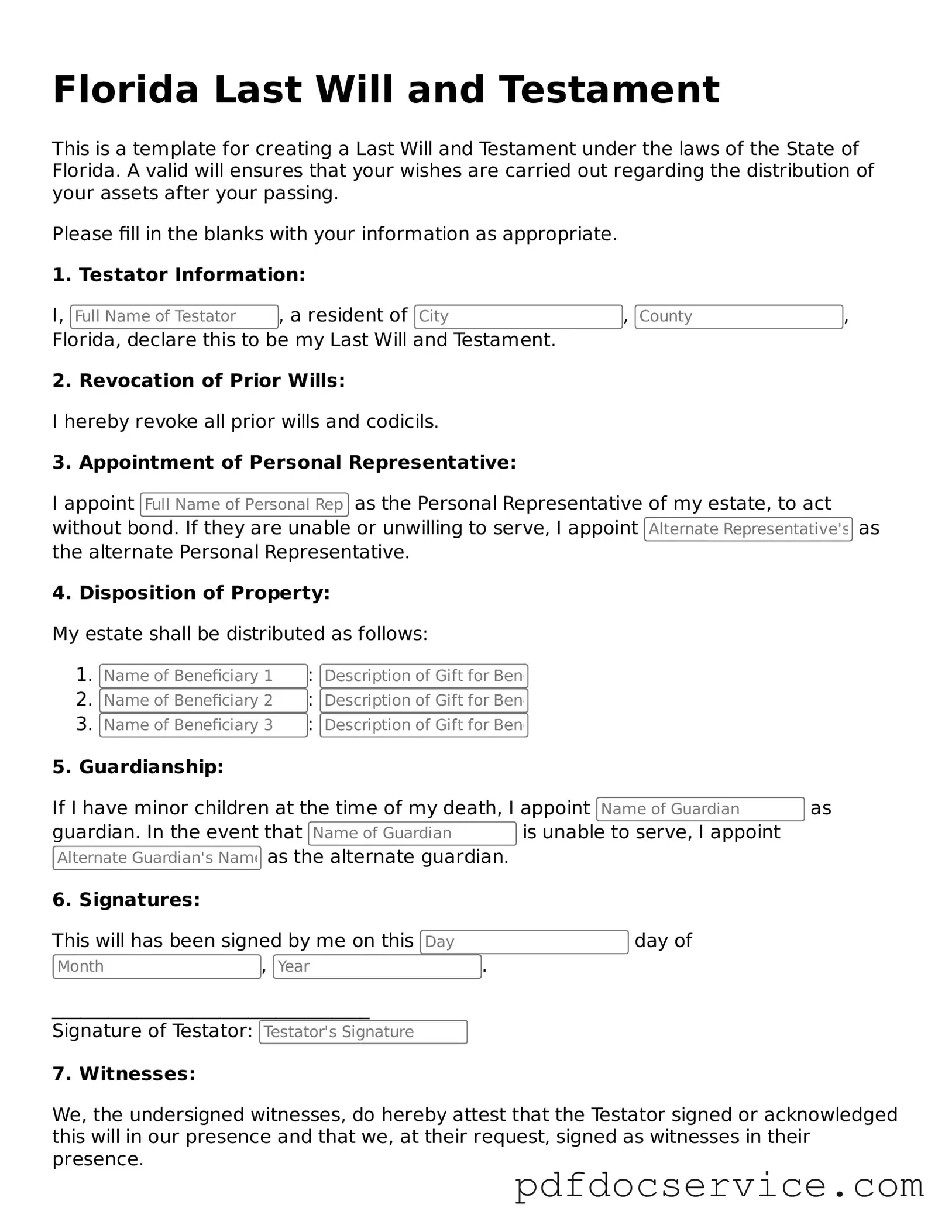What is a Last Will and Testament in Florida?
A Last Will and Testament is a legal document that outlines how a person's assets and affairs should be handled after their death. In Florida, this document allows individuals to specify who will inherit their property, name guardians for minor children, and appoint an executor to manage the estate.
Who can create a Last Will and Testament in Florida?
In Florida, any person who is at least 18 years old and of sound mind can create a Last Will and Testament. This means that the individual must understand the nature of the document and its effects. There are no special requirements regarding citizenship or residency, although it is advisable to follow Florida laws if you are a resident.
What are the requirements for a valid Will in Florida?
For a Last Will and Testament to be considered valid in Florida, it must meet the following requirements:
-
The Will must be in writing.
-
The testator (the person making the Will) must sign the document.
-
Two witnesses must also sign the Will in the presence of the testator.
It's important that the witnesses are not beneficiaries of the Will to avoid any potential conflicts of interest.
Can I change or revoke my Will in Florida?
Yes, you can change or revoke your Last Will and Testament at any time while you are alive and of sound mind. To make changes, you can either create a new Will that explicitly revokes the previous one or add a codicil, which is an amendment to the existing Will. Just remember that any changes must also comply with Florida's legal requirements.
What happens if I die without a Will in Florida?
If you die without a Will, your assets will be distributed according to Florida's intestacy laws. This means that the state will determine how your property is divided among your relatives, which may not align with your wishes. To ensure your preferences are honored, having a Last Will and Testament is highly recommended.
Can I use a template for my Will in Florida?
While you can use a template for your Last Will and Testament, it is crucial to ensure that it complies with Florida law. Templates may not address specific needs or circumstances unique to your situation. Consulting with a legal professional can help ensure that your Will is valid and reflects your intentions accurately.
What is the role of an executor in a Will?
The executor is the person appointed in your Will to manage your estate after your death. Their responsibilities include gathering assets, paying debts and taxes, and distributing the remaining property to beneficiaries. It is important to choose someone trustworthy and organized for this role, as they will be handling significant responsibilities.
How can I ensure my Will is properly executed?
To ensure your Last Will and Testament is properly executed, follow these steps:
-
Make sure the Will is signed by you and witnessed by two individuals.
-
Keep the original document in a safe place, such as a safe deposit box or with your attorney.
-
Inform your executor and close family members about the location of the Will.
Regularly review and update your Will as needed, especially after major life events.
Is it necessary to have a lawyer to create a Will in Florida?
While it is not legally required to have a lawyer to create a Last Will and Testament in Florida, consulting with one can provide valuable guidance. A legal professional can help ensure that your Will meets all legal requirements and accurately reflects your wishes, potentially saving your loved ones from complications in the future.
How do I file my Will after I die?
After your death, the executor is responsible for filing the Will with the probate court in the county where you lived. This process typically involves submitting the original Will along with a petition to open probate. The court will then validate the Will and oversee the distribution of your assets according to its terms.

